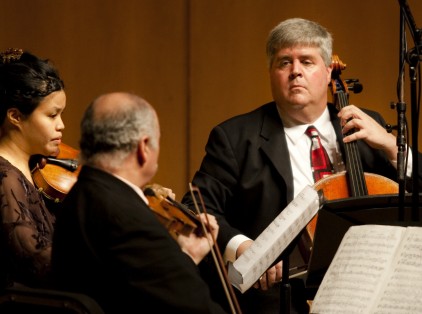Chicago Chamber Musicians bring exuberance and depth to Barber and Stravinsky

CCM violinists Joseph Genualdi and Jasmine Lin and cellist Stephen Balderston perform Sunday at Pick-Staiger Concert Hall. Photo: Nelson Fitch
There is something deeply satisfying about concerts by the Chicago Chamber Musicians. Founded in 1986, it is one of those ensembles that played in top form and seemed to have clear goals from its very first performances. Perhaps that’s not surprising since the founding members included some of the city’s most talented musicians, among them Chicago Symphony Orchestra members clarinetist Larry Combs and horn Gail Williams.
But that sense of being in good hands added an extra dimension to CCM’s concert of 20th-century music Sunday night in Pick-Staiger Concert Hall in Evanston. The hall itself is comfortable and spacious, at night a warmly glowing presence on Northwestern University’s lakefront campus. The evening’s program of works by Stravinsky, Barber and Poulenc expanded that atmosphere of warmth and welcome.
There were some very familiar pieces on the program—an amiable, faintly rollicking morsel from Stravinsky, his Pastorale for violin, oboe, English horn, clarinet and bassoon—and Barber’s early String Quartet, Op. 11, with its famous Adagio. But both works sounded fresh, especially the quartet.
In Barber’s elegiac Adagio, violinists Joseph Genualdi and Jasmine Lin, violist Rami Solomonow and cellist Stephen Balderston resisted the temptation to milk the haunting theme. Their lack of sentimentality was a magnet that drew us into the pathos and longing embedded in the theme’s long, gently curving lines. We often hear this work performed by string orchestra, and the force of those massed voices can be powerful. But at CCM’s performance, as the solo strings reached ever higher, we felt something unexpected—a flicker of hope, even joy, amid the sorrow.
The quartet was equally vivid in Stravinsky’s Three Pieces for string quartet, composed in 1914. Extremely short, often fiercely angled, the pieces are a distinct break from the large-scale ballet scores like Firebird and The Rite of Spring that had made Stravinsky the brash young man of European classical music. Genualdi ripped into the opening bars of the first piece, Dance, with gypsy-like abandon while the quiet Canticle was brooding and hushed.
The mood was more mellow in Barber’s Summer Music, a work for winds from 1955 performed by flutist Mary Stolper, taking the place of the departed Mathieu Dufour, oboist Michael Henoch and bassoonist Dennis Michel as well as Combs and Williams. The players listened intently to each other, even as Stolper’s silvery flute pulled away into a twirling, solo dance or Michel’s nasal bassoon went into a solitary pirouette. Each soloist came and went without ever losing touch with Barber’s unperturbed, underlying flow.
The evening’s largest Stravinsky work—the Octet for flute, clarinet and pairs of bassoons, trumpets and trombone—bristled with energy. Its opening clarion trumpet call set off a chain reaction. Cracking the air like a smartly hit billiard ball, it sent the other players rolling into unpredictable musical territory. Throughout the three-movement work the players responded instantly to one another, whether the mood was up-tempo or introspective.
The concert closed with Poulenc’s Sextet for piano, flute, oboe, clarinet, bassoon and horn. CCM’s newest member, pianist Meng-Chieh Liu, was an exuberant presence. His playing combined tensile, percussive strength with beautifully shaded legato line. He is a terrific addition to the ensemble.
Posted in Uncategorized




